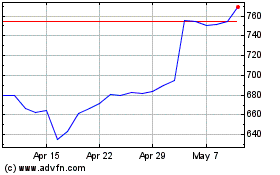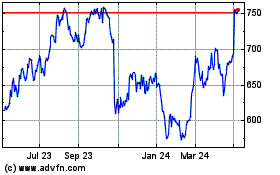Standard Chartered Hopes No-Deal Brexit Planning Will Boost Growth
June 04 2019 - 10:08AM
Dow Jones News
By Nina Trentmann
Britain has twice delayed its split from the European Union and
the terms of the separation remain unclear, forcing financial
institutions to tackle a cardinal risk: the potential loss of the
ability to freely offer products and services across the EU.
Banks that used their operations in London as a base to serve
the rest of the EU, including Standard Chartered PLC, Lloyds
Banking Group PLC and Goldman Sachs Group Inc., have been making
major changes to prepare for Brexit. That includes expanding their
operations in one of the other 27 EU countries to ensure
uninterrupted service for European customers.
Such contingency plans increasingly look justified. Boris
Johnson, the front-runner to succeed Theresa May as British Prime
Minister when she steps down on Friday, said the U.K. should leave
the bloc on Oct. 31, with or without a deal. Mr. Johnson is one of
several would-be successors who are open to a no-deal Brexit.
"Firms in the finance industry have put contingency plans in
place to minimize disruption for their customers in a 'no deal'
scenario, but critical cliff-edge risks remain," said Stephen
Jones, chief executive of UK Finance, an industry association.
Standard Chartered chose to make its Brexit preparations on the
assumption that a no-deal Brexit would happen, a spokeswoman for
the bank said. The company hopes that the operational and
regulatory preparations it made as a result will prime it for
growth across the EU, as well as insulating it from disruption.
Standard Chartered received a full banking license from Germany,
turned its Frankfurt branch into a subsidiary, hired a local
management team including a finance chief, and increased the number
of employees based in Germany from around 100 to 200.
To meet stricter European liquidity and solvency requirements,
the company pumped additional capital into the German unit,
Standard Chartered Bank AG.
"It is important for German regulators that we are able to
survive without our English mother," said Alexander Engel, who
became chief financial officer of the subsidiary in March.
German regulators required more reporting and disclosure in
different formats, prompting Standard Chartered Bank AG to upgrade
its reporting software. "There are up to 400 reports on a regular
basis that we didn't have to file before," Mr. Engel said.
And the bank moved some of its compliance and control functions
from a shared service center in Chennai, India, to Frankfurt, the
main hub for the bank in continental Europe, to satisfy German
regulators. "German regulators have different views on what control
is," Mr. Engel said.
The effort has been worth it, he said. Brexit is an opportunity
for Standard Chartered to grow its footprint in Europe, according
to Mr. Engel.
The bank is seeking new customers, in particular large companies
with an international presence across industries. Mr. Engel said he
plans to use the bank's expanded setup in Germany to grow its
business. Among new offerings for European clients will be a
cash-management facility, alongside existing foreign exchange,
pooling and clearing services.
Standard Chartered already provides these services for corporate
clients in London, but many German companies would prefer to use a
bank based in the same jurisdiction as they are, Mr. Engel
said.
For banks and companies, more hard work is ahead as Brexit
nears. About GBP1 trillion ($1.27 trillion) in bank assets are
being transferred by London-based banks to continental Europe, and
up to 7,000 jobs could from the U.K. to Europe in response to
Brexit, according to Ernst & Young LLP.
Some of Standard Chartered's clients have moved deposits to the
new German entity and amended paperwork so that their continental
European business is no longer booked through London. "The vast
majority of clients have started the repapering process to be ready
when needed," Mr. Engel said.
Other customers are taking a wait-and-see approach, reflecting
doubts about when or whether Brexit will happen.
Banks have already spent an estimated GBP3 billion to GBP4
billion on getting Brexit-ready, a significant expense for an
industry that is one of the core pillars of the U.K. economy,
according to New Financial LLP, a think tank.
The changes that Standard Chartered made won't be rolled back
should Britain decide to stay in the EU, Mr. Engel said. "The point
of no-return has passed, independent of what happens on the
political side."
Write to Nina Trentmann at Nina.Trentmann@wsj.com
(END) Dow Jones Newswires
June 04, 2019 09:53 ET (13:53 GMT)
Copyright (c) 2019 Dow Jones & Company, Inc.
Standard Chartered (LSE:STAN)
Historical Stock Chart
From Mar 2024 to Apr 2024

Standard Chartered (LSE:STAN)
Historical Stock Chart
From Apr 2023 to Apr 2024
